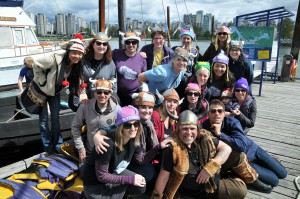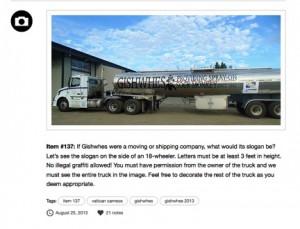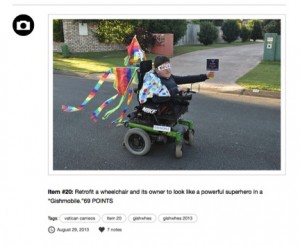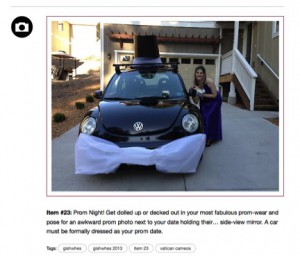On Kale, Transmedia, and Winning GISHWHES
 Have you ever had a life experience you never expected? One that makes you step back and ask: how did I get here? That was me, for basically the whole weekend of the winning team’s reward trip for GISHWHES: the Greatest Scavenger Hunt the World Has Ever Seen. A few choice moments: rising up into the air in a sea plane with half of my teammates, or sitting around a waterside bonfire with our team plus Misha Collins and the other organizers of GISHWHES — these are now cherished memories that in part I can’t quite believe happened, and yet that I’m having a tough time coming back down from. It was made even better that I was there with a strange mix: my five month old son, my BFF, and a group of teammates who had never before met in person but who together had created innumerable strange things (like team uniforms made from kale) in the name of the scavenger hunt that brought us together.
Have you ever had a life experience you never expected? One that makes you step back and ask: how did I get here? That was me, for basically the whole weekend of the winning team’s reward trip for GISHWHES: the Greatest Scavenger Hunt the World Has Ever Seen. A few choice moments: rising up into the air in a sea plane with half of my teammates, or sitting around a waterside bonfire with our team plus Misha Collins and the other organizers of GISHWHES — these are now cherished memories that in part I can’t quite believe happened, and yet that I’m having a tough time coming back down from. It was made even better that I was there with a strange mix: my five month old son, my BFF, and a group of teammates who had never before met in person but who together had created innumerable strange things (like team uniforms made from kale) in the name of the scavenger hunt that brought us together.
GISHWHES is a dada-istic experience of creative mayhem coordinated by actor/genius Misha Collins and his very talented/visionary collaborators, including the mysterious Miss Jean Louis Alexander, who communicates to gishwhesian participants primarily in poetic email missives. You may know Collins as the actor who plays the angel Castiel in the CW series, Supernatural, or you may know him as his satiric Twitter persona, @mishacollins. I discovered Collins through Supernatural, and have followed his various online projects avidly (his twitter, the charity Random Acts, the web series Divine and Cooking Fast and Fresh With West, even Stonehenge Apocalypse), but it was with GISHWHES that I felt most clearly the invitation to participate and create.
I’ve participated in GISHWHES for all three years, for the last two with my now-winning team, Vatican Cameos. The team that wins GISHWHES each year is rewarded with a weekend trip and visit with Misha Collins. For the first year (in 2011), this meant eating pasta with Misha in Rome; the second winning team (2012) spent the night with Misha in a haunted castle; for our year/team (2013), we went to Vancouver, rode on a Viking boat, and flew on a sea plane to an island retreat where we held a séance/bonfire and conjured up some local car salesmen.
Long before I could have fathomed I might be on a GISHWHES winning team, I wrote that GISHWHES models the potential for “transmedia creative authorship” that “finds its engine in the collective coordination and agency of all involved.” I’ve also written about the sense of the intimate collective created by thoughtfully designed transmedia projects — a sense of community facilitated by interaction across coordinated yet open-ended digital fronts. GISHWHES sees the intimate collective and raises it an inappropriate public, in which individuals, families, and team members shed all sense of shame and go out and create silly, provocative, and/or insane public art, later to be shared across online networks. GISHWHES takes the fannish/digital ethos of playful creativity and experimentation and, importantly, awareness of community and our place in it and responsibility to it and enacts it in the world, resulting in images like the ones that pepper this post.
 Although GISHWHES is rooted in embodied as well as digital engagement, I wasn’t prepared for what it felt like to be united with my team and with the GISHWHES creators in person as we were taken on an extravagant and crazy journey through Vancouver. My past work has almost always at least indirectly argued that the relationships we build online can be substantive and nuanced, and every bit as “real” as in person relationships. I almost felt this belief challenged by the experience of meeting my full team and the GISHWHES crew in person. But if we were just a bunch of strangers who hadn’t had this past digital history, meeting together wouldn’t have had the power it did.
Although GISHWHES is rooted in embodied as well as digital engagement, I wasn’t prepared for what it felt like to be united with my team and with the GISHWHES creators in person as we were taken on an extravagant and crazy journey through Vancouver. My past work has almost always at least indirectly argued that the relationships we build online can be substantive and nuanced, and every bit as “real” as in person relationships. I almost felt this belief challenged by the experience of meeting my full team and the GISHWHES crew in person. But if we were just a bunch of strangers who hadn’t had this past digital history, meeting together wouldn’t have had the power it did.
I’ve also always held that as scholars and fans, we congregate around the star “text” rather than the person, and I’ve stayed away from interviewing the figures I study. I’ve written an entire essay on Misha Collins, and at the time it would have felt anathema to me to consider interviewing him; that would have been for a different methodology, a different project. (Since then, I’d already begun to chip away at this assertion in my experience with a press pass at LeakyCon and the access that it gave to producers and actors of The Lizzie Bennet Diaries.) I found this assumption of mine, too, challenged fundamentally by my experience in Vancouver. Misha seemed excited to talk to me about the thought processes behind his Twitter persona and his various transmedia endeavors, and I found myself very much wanting to have that conversation, to integrate his perspective on star texts and branding and the power of limits in digital creativity, to see how what he had to say, or better yet, our dialogue, would change the picture I had created.
Our experience of winning GISHWHES was a rare one and one that very few will be lucky enough to have. But it drove home to me something that I think is at the heart of GISHWHES as a whole and a reason for its growing success: GISHWHES unites our virtual and real worlds, our online and in person social networks, and overturns our assumptions about both. Now I feel the loss of seeing my team in person but look forward to the digital and embodied mayhem we will create this August, when we gish again.



Great piece! I love the way in which you describe the GISHWHES experience.
Having participated last year for the first time, I was bombarded with unexpected twists and turns, but ultimately it came down to the important realization that, by being weird and strange and different, it brought attention to an act or cause that otherwise wouldn’t have garnered such a heavy following. You are forced out of your comfort zone to be better and bigger and unashamed of your unique persona, something I know I personally needed in my life at the time. When you’ve stood for an hour in a park, chatting with the homeless in your community and getting to know their names and what makes them laugh or smile, you evolve into a more complex version of yourself than you would be if you simply clicked a button to donate to a cause.
I maintain to this day that there are certain events that change you for he better by being a part of them, and GISHWHES is right up there at the top of the list.
Again, fantastic article. 🙂
You are forced out of your comfort zone to be better and bigger and unashamed of your unique persona, something I know I personally needed in my life at the time.
I love this description of GISHWHES! The experience is truly transformative in so many ways. I love reading the GISHWHES testimonials because each one is unique to the author and yet together they paint this bigger picture of the way GISHWHES has changed the way they see the world and themselves. I know this is absolutely true for me as well.
Thanks so much for commenting!
Fantastic article, I’m very interested by your insights on fandom and internet-based activities. I’ll be sure to read more of your articles. Thanks for posting.
Kacey–Thanks very much! I’m glad you enjoyed it! Online fandom never ceases to inspire me.
I was utterly fascinated by this article, and, to be frank, I’m dying to read the essay you wrote on Misha Collins and decentred authorship (unfortunately, I can’t access it); I’m a postgraduate student of English literature, and I have never received any opportunities for contemporary media studies like these (Indian academia is ~notoriously outmoded). I’d just love to talk to you in general. As a rabid fangirl I’d finally be able to unite my obsessions and my research, perhaps even specialise in this in my future) but I have absolutely zero scholarly experience, especially in methodology.
Um, sorry, this comment became slightly off-course. Loved the article.
Hi Laboni–Thanks for the lovely comment! I’d be happy to chat with you about fan studies and such. Feel free to email me at stein.louisa at gmail etc. So glad you enjoyed the essay!
This is amazing. I would like to find out how to be a part of this. I feel as though my life is a rut of boring and I would like that to change. I think this would be perfect.